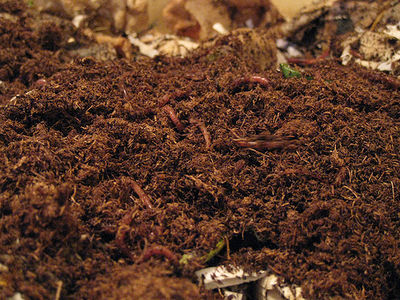Vermiculture: Difference between revisions
Jump to navigation
Jump to search
No edit summary |
|||
| Line 7: | Line 7: | ||
*Making compost and compost tea for fertilizing gardens | *Making compost and compost tea for fertilizing gardens | ||
*[[Integrated_Food_and_Waste_Management_System|IFWMS]]: Chicken feed; Fish feed in [[Aquaponics|aquaponics]] | *[[Integrated_Food_and_Waste_Management_System|IFWMS]]: Chicken feed; Fish feed in [[Aquaponics|aquaponics]] | ||
==Complementary use with [[Black Soldier Fly | Black Soldier Flies]]== | |||
Worms and [[Black Soldier Fly | Black Soldier Flies]] can have complementary uses in an [[Integrated Food and Waste Management System|IFWMS]]. While BSFs are good for putrescent waste, worms may be better for later stages of composting. Both can be used sequentially ("cascading" use). The waste left over from BSFs is not yet finished compost but is a fine input for a vermicomposting system. | |||
==DIY wormeries== | ==DIY wormeries== | ||
Revision as of 23:44, 4 May 2016
Main > Food and Agriculture > Soil and compost
Worms are a key part of most good local food systems. Their main purpose is to convert food waste into compost, which is excellent fertilizer for plants. Vermiculture is the practice of intensively farming worms; these worms then can be scattered around the garden, where they will improve the soil structure and nutrient profile, or they can be fed to small livestock
Uses
- Aerating soil
- Making compost and compost tea for fertilizing gardens
- IFWMS: Chicken feed; Fish feed in aquaponics
Complementary use with Black Soldier Flies
Worms and Black Soldier Flies can have complementary uses in an IFWMS. While BSFs are good for putrescent waste, worms may be better for later stages of composting. Both can be used sequentially ("cascading" use). The waste left over from BSFs is not yet finished compost but is a fine input for a vermicomposting system.
DIY wormeries
- Multi-layer vermiculture bin
- 5 dollar, 1/2 hour Worm Composting Bin(s)
- It's a Vermiculture World
- The Worm-A-Rater
- Worm bin bag for indoor vermicomposting and easy separation of worms from compost
- Worm Cafe - Compost with earthworms right in your garden
